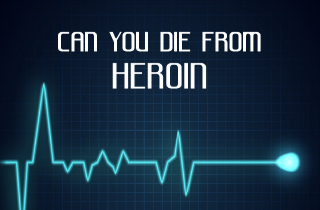Yes!
You can die from heroin. In fact, death from heroin use can be a frequent phenomenon. In this article, we discuss the dangers of illegal heroin use and what you can do to prevent overdose. At the end, we invite your questions about heroin fatality risk, ways to stop taking heroin, or how to treat problems with heroin. Just leave your questions in the comments section and we’ll try to answer you personally and promptly.
What’s in heroin?
Heroin is processed from morphine, which is a naturally occurring substance found in the seedpods of certain types of poppy plants. In the U.S., heroin has no legitimate medical purpose and is classified as a Schedule I illegal substance due to its high abuse potential. It can be found as a white or brownish powder. When it is white, it is either pure or mixed with sugar, starch, quinine, evaporated milk or similar compounds. When found as a darker material, it is usually in a black or brown sticky form because it has been processed by incomplete acetylation of morphine.
FDA warnings about heroin
The U.S. Food and Drug Administration warns that heroin can be a killer drug. Not only is heroin use likely to cause addiction, but heroin is also capable of provoking a myriad of life threatening and fatal consequences. The FDA further points out that addiction to heroin is a progressive disease affecting the brain and, as such, it should be treated as a public health and safety concern.
Serious adverse side effects of heroin
Developing tolerance and addiction are the most common adverse side effects of heroin use. Tolerance to heroin is characterized by the bodily need for more heroin over a period of time in order to achieve initial effect. Dependence is diagnosed during the appearance of unpleasant withdrawal symptoms when heroin is suddenly stopped.
Addiction, on the other hand, is a psychological disorder that develops with the continuous use of heroin despite its negative consequences and often, but not necessarily, goes hand in hand with both dependence and tolerance. Continuous use of heroin may result in any of the following side effects:
- abscesses
- arthritis
- bacterial infections
- collapsed veins
- compromised immune system
- constipation
- infectious diseases
- infection of heart lining and valves
- infertility
- insomnia
- kidney disease
- liver disease
- loss of sex drive
Signs of Heroin overdose
The consequences of overdose from heroin may be serious, harmful and even fatal. While the amount of heroin it takes to OD varies by individual, drug use history, and other personal factors (including drug purity) … a lethal dose for an average 170 lb opiate-naive individual is between 75 and 375 mg, depending on the route of administration. The most common signs of heroin overdose include:
- bluish nails and lips
- clammy skin
- coma
- constipation
- convulsions
- delirium
- difficulty breathing
- disorientation
- drowsiness
- dry mouth
- discoloration of the tongue
- how to treat Heroin overdose
- low blood pressure
- muscle spasticity
- pinpoint pupils
- spasms
- weak pulse
In case you notice any of the above signs, immediately call 911 or the National Poison Control Center (1-800-222-1222) no matter where you are in the U.S. It’s very important not to make the overdosed person throw up unless you are told so by a poison control or a health care professional.
Are you taking too much heroin?
Do you feel as if you need heroin in order to function both mentally and physically? That’s a clue strong enough to claim that you have a problem with heroin.
In fact, no dose of heroin is okay, and the sooner you realize this, the better for you on the long run. Even if you consider yourself an occasional user who is able to stop taking whenever you decide, you are still exposed to a risk of getting addicted. It’s not because you lack control or will power, it’s simply because heroin has to power to make everyone addicted.
Help for heroin use
There are a number of sources in the U.S to help you in giving up on heroin such as:
- Addiction support groups
- Addiction treatment centers
- Clinical psychologists and psychiatrists
- Clinical social workers
- Detox clinics
Talk to your physician to help you decide which one is best suitable for your own personal needs.
Questions about heroin overdose
Do you still have questions about treating heroin addiction and overdose? Please share your questions and experiences and we will try to respond to your questions personally and promptly.









Related Posts